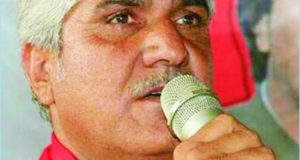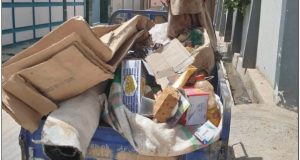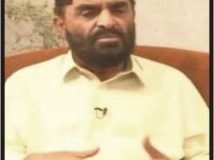Azar Ali, 42, is resident of Mariabad, Quetta. He belongs to Shia Hazara community and a government servant whose two brothers and some of his relatives migrated to Australia more than a decade ago due to the deteriorated law and order situation. However, Azar Ali (His real name has been changed due to security reasons) himself decided to stay in Quetta with his family despite the fact that he was offered to settle in Australia by his brothers and other relatives, but he did not want to go and leave his hometown.
“I know our country is fighting terrorism but I can’t leave my country and hometown Quetta as I have had great memories here and now peace is returning in our province,” Azar Ali told Balochi Zind, adding that he had lost his many friends and relatives in bomb blasts and target killings in Quetta during the past one decade. However, Azar Ali said that he avoids regular visit to markets and public gatherings besides taking preventive measures to reach office and return back home.

A view of Prince Road Quetta |
Balochistan has been peaceful province of Pakistan by 2003. However, in July 2003, Quetta witnessed a deadly sectarian attack by a sectarian outfit on Shia Mosque at Prince Road, killing more than 53 people of Hazara community and wounded 150. Before this brutal incident, a number of police cadets were gunned down at Sariab Road. Lashkar-e-Jhangvi (LeJ) had been held mastermind of those deadly attacks. Since then, with little respite, incidents of sectarian violence continued. However, it took an uglier turn after 2010, and 2013 was proved to be more destructive year for Hazara community.
Lashkar-e-Jhangvi, Tahreek-e-Taliban Pakistan, ISIS and some other splinter sectarian groups remained in news in deteriorating law and order throughout Balochistan.
“We feel a bit of insecurity while traveling on highways as we are easily recognized due to our physical look,” said Muhammad Hussain, hailing from Shia community.

A police personnel stands alert at Anscomb Road Quetta |
Hussain is optimistic that peace would soon restore across the province and they would be able to move anywhere without fear. “No doubt the number of attacks on Shia community had declined but still more efforts were needed to improve law and order and to maintain peace in the province.
Previously, people hailing from Shia community particularly Hazara were the main target of banned religious extremist groups, however, later they targeted Shrines, Zikris and political leaders regardless of creed and sect.

Hazara Labourers busy in a construction work in Hazara Town Quetta |
In October 2017, over 20 people were killed in suicide bomb attack at Dargah Pir Rakhel Shah in Fatehpur, a small town in the Jhal Masgsi district. Similarly, approximately 52 people were killed and 102 were wounded in Shah Norani of Khuzdar district claimed by ISIL while terrorists carried out suicide attacks and gunned down 61 Police recruits in Quetta PTC Sariab. PTC attack was claimed by Islamic State, however, former Home minister Balochistan Sarfiraz Bugti had claimed the attack was carried out by LeJ Al Alamai. Moreover, a ferocious bombing in July 2018 that claimed the lives more than 200 people, including that of Nawabzada Mir Siraj Raisani candidate of Balochistan Awami Party was claimed by banned outfit TTP.
Advisor to Chief Minister Balochistan and leader of Hazara Democratic Party, Abdul Khaliq Hazara told Balochi Zind that the law and order situation had improved significantly throughout the province. “In 2008 there were 70 gangs of kidnapping for ransom, and this fact was disclosed by legislators on the floor of assembly while today people are traveling freely on all highways,” he said, adding that as far as incidents of sectarian violence was concerned they had declined to a satisfactory level. HDP leader said that with efforts of incumbent government the law and order situation was getting more conducive in Balochistan with each passing day as government had kept this in its top priority.

Advisor to Chief Minister Balochistan and President HDP Abdul Khaliq Hazara |
Muhammad Tariq, resident of Nushki district, where so far no major incident of sectarian violence has occurred told Balochi Zind that though Nushki has had peaceful history regarding sectarian violence, however, people were still in stress owing to terror and alleged presence of members of banned religious extremist groups. “In past people would debate on literature, nationalism and religion without any fear but now they avoid doing so,” he added.
In 2014, all private schools and English language centres in Panjgour district were closed for an indefinite period after an ultimatum by a militant outfit rejected to co-education. A little known Tanzeem-ul-Islam-ul-Furqan’s had allegedly intercepted a van, forced female students to disembark and had set up van on fire. In the same year a private school principal Zahid Askani was shot dead by unidentified assailants, later ISIS had owned the murder.
Inspector General of Police Mohsin Hassan Butt briefing reporters said that 1,245 Intelligence Based Operations (IBOs) and 1,869 combing operations were conducted under the National Action Plan across Balochistan in 2018 in which 55 terrorists were killed and 4,188 absconders and 5,449 accused were arrested. They belonged to 22 militant groups.
Home Minister Balochistan, Mir Zia Langov said talking to Balochi Zind said that anti-Pakistan elements from cross- border trying to destabilize Pakistan particularly to derail China Pakistan Economic Corridor. “Balochistan is peaceful, there is no existence of banned religious outfits like Taliban and Daish, however some elements from neighboruring country are carrying out terrorist attacks which were being foiled by our security forces,” he said, adding that in Balochistan the issue of missing persons was being resolved and Balochistan has now become a peaceful destination for everyone.

Home Minister Balochistan Mir Zia Langov |
“The banned outfits are still existed in various parts of the province and they are targeting security forces and masses, showing their presence despite the fact that government has succeeded to a great extent to ensure its writ throughout the province,” said Jalal Noorzai, a senior journalist and analyst who regularly writes on political and security issues of Balochistan.
Talking to Balochi Zind, Jalal Noorzai said that in past LeJ, TTP and other extremist outfits had close links with each other in FATA and other parts of the country who used to carry out brutal attacks on security forces, Shia and Sunni communities. “As far as Balochistan is concerned, still banned religious groups are existed who carry out attacks in Quetta and other parts of the Balochistan province,” he said.

Senior Journalist and analyst Jalal Noorzai |
Mr. Noorzai said that besides religious extremist groups Baloch armed groups were also subsisted in various parts who, however, had their own political and separate version of struggle which could be resolved if political dialogue was initiated. “Govt. has taken serious step to trace out missing persons and hope it will also initiate process of negotiation to bring durable peace in the province,” he said.-
 Monthly Balochi Zind Noshki
Monthly Balochi Zind Noshki



